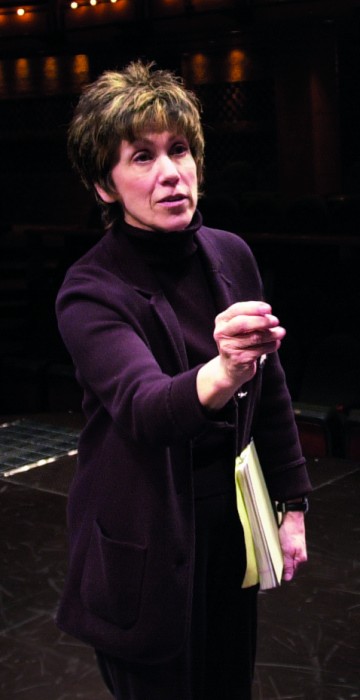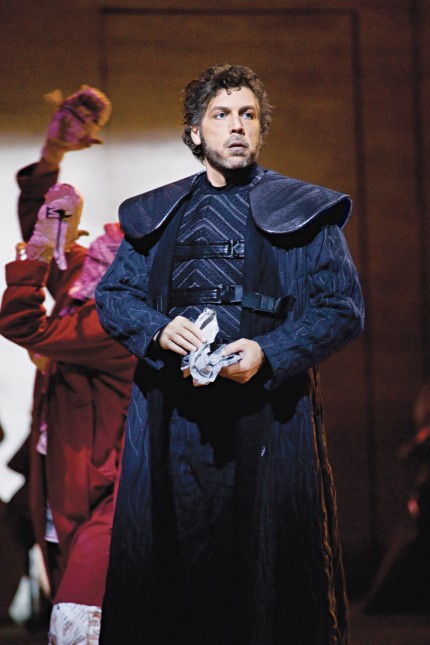Lyric Opera’s season-opening “Macbeth” to be pure Gaines

Call it an operatic Crosstown Classic.
Lyric Opera of Chicago opens its 56th season Friday night with a new production of Verdi’s Macbeth starring baritone Thomas Hampson and soprano Nadja Michael as Shakespeare’s power couple from hell. And directing the production, in her first outing on the opera stage, is Barbara Gaines, one of Chicago’s leading stage directors and founder of Chicago Shakespeare Theater.
Gaines and Lyric have been on each other’s radar for more than a decade, said Lyric’s general director William Mason.
“My first encounter with Barbara,’’ said Mason, “was seeing her productions at the Ruth Page Theater and being terribly impressed.” Gaines invited Mason to speak at a dinner celebrating her company’s new Navy Pier home in 2000, and the two became friendly.
“We started getting together for lunch twice a year or so,’’ said Mason, “just chatting about our mutual whatevers. We allowed as how it would be nice if we could do something together.”
Plans began to solidify when Lyric started discussing a new Macbeth production with Hampson to replace the controversial David Alden staging of 1999-2000. Hampson caught up with Gaines’ work at Chicago Shakespeare while appearing in Thais with Lyric in 2002-03.
“Tom Hampson had seen a production of hers and liked it,’’ said Mason. “They had a chance to speak, so it all kind of pulled together.’’
Gaines, a small dynamo with a pixie haircut, has won national and international recognition for her way with Shakespeare. Chicago Shakespeare Theater appeared at Stratford-on-Avon in 2006 during a festival hosted by the Royal Shakespeare Company and won the prestigious Tony Award for excellence in regional theater in 2008. Gaines has directed more than 30 Shakespeare plays, including a modern-dress Macbeth at Chicago Shakespeare Theater in January 2009.
But until now, the operatic stage has been terra incognita for her.
Gaines grew up in Port Chester, a suburb of New York City, before coming to Chicago to study theater at Northwestern University in the late 1960s. She saw a few operas as a little girl, attending performances at the old and new Metropolitan Opera houses with her mother and grandmother.
“I had gone to the opera,” she said, “but I certainly wouldn’t say I was an opera buff. The theater drew me. I didn’t remember the music so much as the stagecraft. I remember moments,” she said, her voice full of excitement, “the entire stage at the new Met rising from a cave, an ugly dark cave, and suddenly from the floor, there was a ballroom scene, with what looked like 100 people dancing.”

According to Gaines, Hampson is probably the reason that she and Mason finally moved ahead with the collaboration they had been talking about for years.
“Tom had seen my work and actually asked me in the lobby of our theater, ‘Why aren’t you directing me?’” said Gaines. “I said, ‘Oh my God, I have no idea. We’ll have to talk to Bill about that.’ Well, I’m guessing that he did.’’
Verdi insisted that his operas inspired by Shakespeare—Otello and Falstaff as well as Macbeth—make extensive use of the playwright’s own words. But Gaines knew that Verdi’s Macbeth was not simply a matter of the play she knew so well set to music.
“After I finished reading Opera for Dummies,” Gaines said with a smile, “I realized that you cannot learn any of this from any book. You had to learn this from people. I needed a teacher.”
She had several sessions with the production’s conductor, Renato Palumbo.
“I went through every note, every crescendo,’’ said Gaines. “I would say, ‘Why did Verdi give this a high C? What does that mean musically?’ Then I realized all that information was fine, but what’s really important with Verdi and Shakespeare—they share this—is that the music is completely character-oriented, as Shakespeare’s language is character-oriented.
“Then I had to say, ‘How does this B-flat make me feel? What are the feelings it provokes?’ That was exciting, and that’s when I remember falling in love. Sitting at my desk at home, falling in love, having the honor of being inside this amazing score.”
Gaines also consulted Gary Griffin, her associate artistic director at Chicago Shakespeare, who directed Lyric’s The Merry Widow last season. He advised her to go into this new world with a trusted production team. Set designer James Noone, Virgil C. Johnson, costumes, and Robert Wierzel, lighting, have worked with Gaines often and also have opera-world experience.
Unlike her Macbeth at Chicago Shakespeare Theater last year, the opera will unfold in a timeless universe. “The costumes,’’ Gaines said, “could have been worn in Troy, or they could have been worn in Milan last week.’’
The goal, she said, is to explore “the profound timelessness and repetition of ambition and evil, the nature of evil and how ordinary evil is.”
That grim task is progressing under unusually cheerful rehearsal conditions. Mason describes Gaines as “delightful” and “charming,’’ full of infectious enthusiasm for the project.
“She’s a kick,’’ said Hampson, one of opera’s finest actors as well as an acclaimed singer who has been portraying Verdi’s tormented Macbeth for nearly a decade. “We seemed to be very much on the same page. We’re trying to tell essentially the same story with just different sets of tools—a Shakespeare play versus an opera. But the agenda is still the inside of these people. It’s just wonderful to work with somebody with the vast knowledge and experience that Barbara has. It’s fun.’’
“First of all, she’s a wonderful human being,’’ said Michael, whose Lady Macbeth has been praised for its “animal power.’’ “The way she works is very warm; it’s a very good and warm atmosphere, though we are dealing with a very cold topic.
“I can feel that she used to be an actress,’’ said the German soprano,” that she is used to working with actors. She implants ideas and then opens the space to what is growing inside us. She is very specific about certain things, but around this you can build your own character.”
Gaines is the latest in a line of distinguished Chicago-based directors tapped by Lyric, among them Frank Galati, Robert Falls, Charles Newell and Griffin (who directs Lyric’s new production of The Mikado later this season). Lyric began using local directors in the 1990s with its Toward the 21st Century initiative, a program that brought two 20th century operas, some newly commissioned, to Lyric’s stage every season between 1991 and 2000.
“This came about as the Chicago theater scene was becoming so important,’’ said Mason. “Toward the 21st Century was a very definite recognition of that. You bring over some of these big Europeans, and they’re basically just theater directors in their own home towns. We have great theater in the city here, so let’s make use of that.’’
Lyric presents nine performances of Macbeth Oct. 1-30, kicking off a season of 68 performances of eight operas running through March 27, 2011. Remaining operas are Bizet’s Carmen, Britten’s A Midsummer Night’s Dream, Verdi’s A Masked Ball, Gilbert and Sullivan’s The Mikado, Puccini’s The Girl of the Golden West, Wagner’s Lohengrin and Handel’s Hercules. lyricopera.org; 312-332-2244
Posted in Articles

